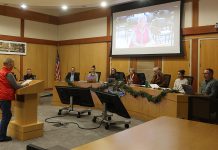The con might be a fake real estate deal, a tall-tale about a
grandchild in trouble or simply an unattended checkbook or credit
card in the wrong hands. When the dust settles a lifetime of saving
and security can be lost and never recovered.
Law enforcement and advocacy groups in Sonoma County are seeing
an increase in elder fraud, recounting heart wrenching stories of
seniors duped out of life savings by people they trust or strangers
promising a quick buck with a short-term investment.
“For many of these criminals their weapons are the phone, the
mail or a knock on the door,” said Sonoma County District Attorney
Stephan Passalacqua. “We realize that seniors are isolated and
that’s why we’ve been holding forums throughout the county to bring
information to empower and prepare seniors against these
frauds.”
Law enforcement agencies and advocacy groups agree that senior
citizens are a favorite target to conmen and unscrupulous family
members and caregivers, sometimes stealing small fortunes before
anyone catches on.
“Inevitably, we see seniors who have been working their entire
lives and saving their entire lives and the money is just gone,”
said Robin Hammond, a major fraud prosecutor with the DAs office.
“We try to get as much money as we can during the plea process but
often it’s too late.”
Some victims, like the 90-year-old Sebastopol woman who was
duped out of $59,000 by a contractor who never did work he
promised, recover money through restitution agreements. Jorge
Anguiano avoided a longer jail sentence by agreeing to pay the
woman $500 a month until the debt is paid back.
Others, like another 90-year-old Sebastopol woman who gave a man
more than $500,000 in a phony real estate deal in Healdsburg, will
recover little–if anything. “The DAs offer to [Juan Carlos Alcala]
was that he’d pay a substantial amount of restitution for less jail
time,” said Hammond. “He didn’t agree to that.” Alcala apparently
laundered the money through his private bank account and with
cashier’s checks. Investigators have been unable to recover any of
it.
And then there’s the close calls, like the Healdsburg woman who
earlier this month wired $3,800 to someone in Canada claiming to be
her granddaughter–and in trouble. The woman sent the money but
later recovered it when she realized it wasn’t really her
granddaughter. The scam, known as the “fake grandchild in trouble,”
has been documented in hundreds of cases around the United States
in the past few years.
The wide variety of fraud and scams has elder advocates
scrambling to educate their senior citizens so they can guard
themselves from unscrupulous caregivers, family members and
strangers.
Susan Ziblatt, executive director of Senior Advocacy Services in
Santa Rosa, has seen an increase in elder fraud in the past year.
Many victims she sees are targeted by family members or caregivers,
people who know how to take advantage of an unwatched bank account
or credit card. Others approach their victims offering home repair
or investment opportunities.
Unfortunately, Ziblatt said many don’t report it right away, or
ever. “When you come to be a senior there’s a fear that family and
friends won’t feel you’re competent anymore when you screw up,” she
said. “They’ll hide it as long as possible. They don’t want to be
asked to leave their home and enter assisted living.”
Passalacqua said his office has heard the same fears from
victims. “They’re embarrassed, they’re fearful of retaliation,” he
said. “They’re concerned about losing their independence, that
they’ll have to go to a rest home.”
Passalacqua said many of the thieves prey on these fears. “Most
con artists understand that seniors are a vulnerable part of our
population,” he said.
How vulnerable are these seniors? Prescott Close, a staff
attorney for California Advocates for Nursing Home Reform, points
to a study out of the University of Iowa that shows that 35-40
percent of senior citizens tested experienced a loss of critical
thinking ability. Or, in other words, they make decisions the same
way someone with a traumatic brain injury does, responding
positively to repeated messages.
“They make gut decisions,” he said. “They’re not critical
thinkers anymore and that’s why they make knucklehead decisions.
It’s not that they don’t understand, it’s that they can’t. These
are people who have the money and they’re losing the capacity to do
what’s in their own best interests.”
Close is especially concerned with reverse mortgages that are
often not in a senior citizen’s best interests yet have become more
and more popular in the past five years. In 2003 he said only 8,000
reverse mortgages were sold nationwide. “Now it’s 120,000 to
140,000 a year,” he said. These deals might pay out $100,000 today,
but over the next decade the debt can grow to more than double,
decimating a senior’s estate.
“What the seniors are told is ‘if you’ve got money problems,
don’t worry about it, you have equity in your house,’” he said.
“They’re told the money is never due until you move out or you
die.”
Unfortunately, Close said that’s often not true. Home owners are
expected to pay for upkeep and maintenance of the house and, if
they don’t, the bank can seize the house to preserve its investment
in the property. “You’re going to lose your home and that’s what’s
in store for many of these seniors.”
Close’s advocacy group recently sponsored a new law that
requires lenders and brokers to give seniors a check list that
outlines some of the consequences of reverse mortgages. “If all the
senior hears is the rewards of a reverse mortgage and they hear it
over and over, then 35 to 40 percent are almost certain to succumb,
even if a reverse mortgage is not in their best interest.”
While attorneys like Close work with politicians to add and
improve laws, the DA and senior groups throughout Sonoma County
continue offering workshops to teach families how to protect
themselves. “It’s important for families to stay involved,” said
Ziblatt. “Anyone who suspects elder abuse is going on should report
it.”
“It’s time to have an adult conversation with your children,”
said Close. “Seniors still don’t like to talk to their kids on a
one-on-one basis about their money. They’re adults now, and you
want your kids involved as loving partners to help make financial
decisions.”








